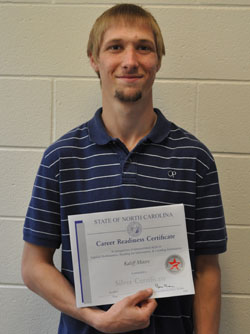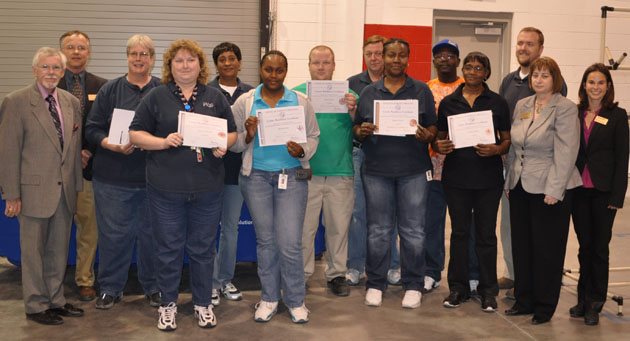REAL News for REAL People
BCCC providing new certification for workers

Pictured above is Kaliff Moore, Beaufort County Community College's first General Education Development student to simultaneously earn a GED Diploma and Career Readiness Certification. He successfully completed both in February.
Once Moore began working on his CRC, he realized how the GED and the workplace are connected. The CRC reinvigorated his desire to complete the work for his GED. Moore credits the CRC program and the Basic Skills staff with helping him to finally reach his goal of earning his GED. Moore plans to take advantage of his recent accomplishments by continuing his education at BCCC and, thereby, furthering his options for employment.
The Career Readiness Certificate Consortium was formed between seven states in 2004 in response to employers who are increasingly concerned with ensuring that both potential and incumbent employees have the skills necessary to thrive in today's workplace. Currently, there are 38 states offering some level of CRC training and testing. In a very short time, the CRC program has come to be recognized not only as an industry standard, but also as an important tool for both business recruitment and retention.
BCCC began developing its CRC program in 2007. To date, three of Beaufort County's employers - Potash Corp, of Aurora, and MegaForce and PAS, of Washington - have joined forces with BCCC to offer CRC training for incumbent workers and CRC testing for potential employees. BCCC has also committed itself to embedding CRC training into its Basic Skills programs and selected Occupational classes. BCCC is prepared to enlarge the CRC program as new and existing businesses request it.
BCCC's Basic Skills program is piloting KeyTrain, the online training program for CRC. Enrolling in this program allows BCCC GED students to learn basic skills required for passing the GED, while also earning the CRC. Because it's online, KeyTrain makes it a bit easier for the student to put in additional hours and practice outside of the regular classroom.
North Carolina's CRC certifies core employability skills required across multiple industries and occupations. The CRC is a portable credential that promotes career development and skill attainment for the individual and confirms to employers that an individual possesses basic workplace skills in reading, applied math and locating-information skills that most jobs require.
The CRC is based upon WorkKeys, a nationally recognized, skills-assessment tool developed by American College Testing, Inc. North Carolina's CRC has three levels: Bronze, Silver and Gold. The three levels allow an individual to advance his or her reading, applied math and locating-information skill levels in order to qualify for more jobs.
An individual achieving the Bronze Level of certification possesses core employability skills for approximately 30 percent of the jobs profiled by WorkKeys. At the Silver Level, an individual possesses core employability skills for approximately 65 percent of the identified work; and at the Gold Level, a person is prepared for approximately 85 percent of the job tasks they will encounter.
 Pictured above are several employees of the PAS plant in Washington who recently completed CRC training, testing and certification offered through BCCC at their worksite. From left to right are: Dean of Continuing Education Chet Jarman, Small Business Center Director Lentz Stowe, Mary Weeks, MaryJo Edwards, JoAnn Haddock, Rosetta Peck, Raven Jones, Rick Cauwels, Regina Harris, Miguel Howard, CC Boomer, Chris Currin, CRC and Special Programs Coordinator Lou Stout and Customized Training Coordinator Lauren Spruill. Those who completed the same training, but are not pictured are: Thomas Devereese, Linda Garrett, Thomas Clark Parham, Willie Smith, Carolyn Cooper and Billy Weathers.
Pictured above are several employees of the PAS plant in Washington who recently completed CRC training, testing and certification offered through BCCC at their worksite. From left to right are: Dean of Continuing Education Chet Jarman, Small Business Center Director Lentz Stowe, Mary Weeks, MaryJo Edwards, JoAnn Haddock, Rosetta Peck, Raven Jones, Rick Cauwels, Regina Harris, Miguel Howard, CC Boomer, Chris Currin, CRC and Special Programs Coordinator Lou Stout and Customized Training Coordinator Lauren Spruill. Those who completed the same training, but are not pictured are: Thomas Devereese, Linda Garrett, Thomas Clark Parham, Willie Smith, Carolyn Cooper and Billy Weathers.An individual can receive a CRC by testing at the appropriate skill levels on the WorkKeys assessments. These assessments may be taken at your local community college or JobLink Career Center. For individuals who do not initially achieve the certificate, assessment results will indicate targeted training needed in order to achieve the skill levels necessary to obtain the certificate. The targeted training could include re-mediation within the Basic Skills Program at BCCC, or other courses.
The skills measured by the CRC test include: problem solving; critical thinking; reading and writing work-related text; applying information from workplace documents to solve problems; applying mathematical reasoning to work-related problems; setting up and performing work-related mathematical calculations; locating, synthesizing and applying information that is presented graphically; and comparing, summarizing and analyzing information presented in multiple related graphics.
"We are using the WorkKeys Assessment System as a tool for pre-employment testing," said Chris Toppin, the Human Resources Manager at Potash Corp. "This test has proven to be a good indicator of value-added employees who can adapt to the safety culture at Potash Corp. We are now in the process of identifying the required WorkKeys skills for higher-level positions within our maintenance and operations departments. Once they are identified, we will be able to incorporate WorkKeys into our Skills Training and Promotion Plan."
For more information on how to obtain a North Carolina CRC certificate or how to coordinate the program with your business, please contact Lou Stout at 252-940-6307, or via e-mail at lous@beaufortccc.edu.
| Southside students place at State Leadership Conference | Community, Beaufort County Community College, School News | Dr. Karen Thomas to deliver BCCC commencement address |
Latest School News
|
ECU dental school marks statewide care milestone with 100,000 patients served
Published: Monday, March 25th, 2024 @ 1:23 am
By: ECU News Services
|
|
Dog-walking class celebrates 10 years, professor’s service award
Published: Sunday, March 24th, 2024 @ 8:14 am
By: ECU News Services
|
|
WASHINGTON, NC— Beaufort County Community College has eight-week, online "Late-Start" courses starting March 6.
Published: Saturday, March 23rd, 2024 @ 4:39 pm
By: Attila Nemecz
|
|
King encourages grads to plant seeds of hope
Published: Sunday, March 3rd, 2024 @ 8:21 am
By: ECU News Services
|
|
A new scholarship will help more North Carolina families attend university and offer them debt-free community college.
Published: Saturday, March 2nd, 2024 @ 2:50 pm
By: Attila Nemecz
|
|
A Google search on Pirates and New York City yields numerous results, including a Seattle Times article stating that in New York in 1692, “piracy was a leading economic-development tool in the city’s competition with the ports of Boston and Philadelphia.”
Published: Friday, March 1st, 2024 @ 3:20 pm
By: ECU News Services
|
|
The turquoise waters surrounding the small island chain that includes Guam and the Northern Mariana Islands hold opportunities for exploring future wind energy projects. But they also hold important archaeological and cultural heritage sites.
Published: Wednesday, February 28th, 2024 @ 10:53 am
By: ECU News Services
|
|
WASHINGTON, NC— The Beaufort County Community College Foundation received a $40,000 donation from the First Annual Belhaven Trout Tournament and Festival.
Published: Tuesday, February 27th, 2024 @ 5:02 pm
By: Attila Nemecz
|
|
BCS Calendar February 2024 Updated
Published: Sunday, February 25th, 2024 @ 10:33 pm
By: Eastern NC NOW Staff
|






















